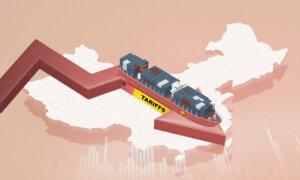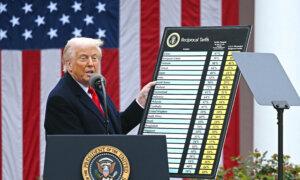The president said the United States is benefitting from the period of slowed trade, referencing the decades-long trade deficit with China.
President Donald Trump said on May 4 that he has no plans to reduce tariffs on Chinese goods in order to bring about negotiations, spurning a demand made by the Chinese Communist Party (CCP).
On May 2, the Chinese commerce minister insinuated that China would only come to the table following a cut in tariff rates by the United States. NBC’s “Meet the Press” anchor Kristin Welker referenced those remarks in an interview with Trump that aired Sunday, asking whether he would meet those demands.
Trump promptly replied “No,” saying that more recent signaling had been favorable about pending negotiations. He insinuated that China’s public messaging was scattered, saying that “you have 15 different” people speaking for China.
Speaking about what comes next in negotiations between the United States and China, Trump said, “They said today they want to talk.”
Later on May 4 aboard Air Force One, Trump told reporters that he wasn’t planning to speak with CCP leader Xi Jinping this week but said that lower-level officials for both nations were meeting. Trump said his main priority for the U.S.-China relationship is securing a fair trade deal.
Asked about the possibility of meetings with CCP officials or other foreign nations in producing any new trade agreements this week, Trump said that could “very well be” but didn’t provide details.
Shortly after Trump took office in January, the United States escalated retaliatory actions in the escalating trade war between the world’s two largest economies, which started even before China joined the World Trade Organization in 2001. Currently, the United States imposes a 145 percent duty on Chinese imports, while the CCP has retaliated with a 125 percent tariff on U.S. imports.
Last week, the Chinese commerce ministry indicated that China is open to speaking to the United States but demanded a cancellation of the current tariffs, which Trump announced in order to force the difficult trade talks, as a prerequisite.
“So you’re not prepared—just to be very clear, you’re not dropping the tariffs against China to get them to the negotiating table?” Welker asked.
Asked whether he would lower the rates, Trump suggested he plans to do so eventually but gave no hard timeline.
“At some point, I’m going to lower them because otherwise, you could never do business with them and they want to do business very much. Look, their economy is really doing badly. Their economy is collapsing.”
Trump said the United States, meanwhile, is gaining from the period of slowed trade, referencing the decades-long trade deficit between the United States and China.
“We were losing hundreds of billions of dollars with China. Now, we’re essentially not doing business with China. Therefore, we’re saving hundreds of billions of dollars. Very simple,” Trump said.
“Look, China—and I don’t like this, I’m not happy about this—China’s getting killed right now,” Trump said. “Their factories are closing, their unemployment is going through the roof. I’m not looking to do that to China.
“Now, at the same time, I’m not looking to have China make hundreds of billions of dollars, and build more ships and more army tanks and more airplanes.”
Original News Source Link – Epoch Times
Running For Office? Conservative Campaign Consulting – Election Day Strategies!


